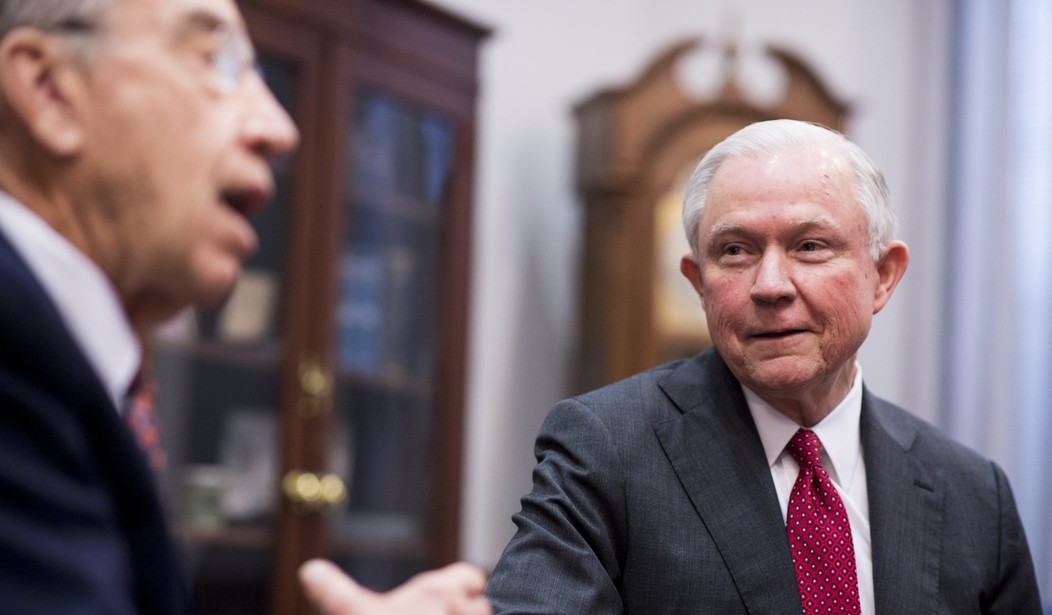Even though it’s projected to be a $23 billion national industry by 2020, the nation’s marijuana industry is as paranoid as a pot smoker in the 1970s who spotted the flashing lights of a police car in his rearview mirror.
Marijuana is now legal for recreational and/or medical use in 29 states. But pot entrepreneurs from California to Maine are afraid a man who said “good people don’t smoke marijuana” could bring their dreams to a crashing halt.
And he could.
The group Californians Against Legalizing Marijuana (CALM) hopes he does.
That man is Sen. Jeff Sessions, a Republican from Alabama, who has been nominated by President-elect Donald Trump to serve as the next attorney general.
The 500-pound elephant in the room that could crush the dream of legal reefer madness is that growing, selling and smoking pot is all still a federal crime. The Obama administration just chose to ignore that, and before you could say “don’t bogart that joint” more than 65 million U.S. citizens lived in states where they could roll and burn one without violating state laws.
Of course, federal law always supersedes state law. That gives Sessions the power to stamp out marijuana reform.
And being paranoid doesn’t mean people really aren’t out to get you.
Sessions criticized President Obama, FBI Director James Comey and attorneys general Eric Holder and Loretta Lynch at a Senate hearing earlier this year for declining to enforce federal marijuana laws.
“You can’t have the president of the United States of America talking about marijuana like it is no different than taking a drink… it is different….it is already causing a disturbance in the states that have made it legal,” Sessions said.
Still, Marijuana Policy Project’s communications director Mason Tvert is trying to stay positive.
“We remain hopeful that the incoming administration will refrain from interfering in state laws that were adopted by voters or their elected representatives in order to control marijuana and improve the health and safety of their communities,” Tvert said. “There is a large and growing sentiment in Congress and among the American public that our federal government should not be wasting tax dollars enforcing failed marijuana prohibition laws.”
Troy Dayton runs the Arcview Group, an investment and market research firm that includes an angel investor network of more than 600 accredited investors. He said the investors in the network have already put more than $88 million into better than 135 companies.
He wondered why anyone would want to stop that kind of business growth.
“It would be political suicide for the Trump administration to go against a campaign promise on a hugely popular issue that won even among their demographic,” Dayton told NPR.
Maybe not. Support might not be as strong as Dayton would like, even in some states where voters cast ballots in favor of legalized marijuana.
“I don’t like the idea of implementing laws in Arkansas that violate federal law,” Arkansas Gov. Asa Hutchinson (R) told the Northwest Arkansas Democrat-Gazette. “This does not call for a state-by-state solution, it calls for … a national solution.”
The Boston Globe reported Massachusetts Gov. Charlie Baker (R) and other legislative leaders were talking about changing some parts of a ballot proposition to legalize marijuana less than 24 hours after voters approved it.
“I believe that when voters vote on most ballot questions, they are voting on principle. They are not voting on the fine detail that is contained within the proposal,” Senate President Stanley C. Rosenberg (D) said.
Maine voters approved a ballot referendum to legalize pot by a slim margin in November. A recount of the votes cast on the proposal began Dec. 5.
Even if the recount shows the measure does pass, Gov. Paul LePage said he would “be talking to Donald Trump” for guidance about how to implement it.
And if Trump turns thumbs down to the idea of legal weed in Maine, LePage told the Maine Sun Journal he would “have no choice except to not put this into play.”
The CALM group fought against Prop. 64, the November ballot proposal to legalize marijuana in California.
The organization claimed that projections of a $6.5 billion pot industry in California and a windfall of $1 billion in new tax revenue were a ruse perpetrated by entrepreneurs chasing the mighty marijuana dollar.
CALM lost. But the group now hopes to rally state residents to convince Sen. Sessions, as attorney general, to strictly enforce the federal anti-marijuana laws.
“We now urge the people of California to call for federal enforcement of the Controlled Substance Act against commercial marijuana operations, trafficking, advertising and sales,” CALM wrote on its blog page. “We also urge every jurisdiction, city, county and community to enact land-use policies that block marijuana dealers from setting up shop in their communities and to create fines and penalties to help pay for the enforcement necessary to stop this insidious public health and safety plague.”
What will the millionaires who are already invested in the industry do if CALM wins this fight?
“One presidency isn’t going to stop the work that we’re doing,” Steph Sherer, the executive director of Americans for Safe Access, a group that lobbies for legal marijuana, told NPR. “We’re going to break the federal law.”









Join the conversation as a VIP Member